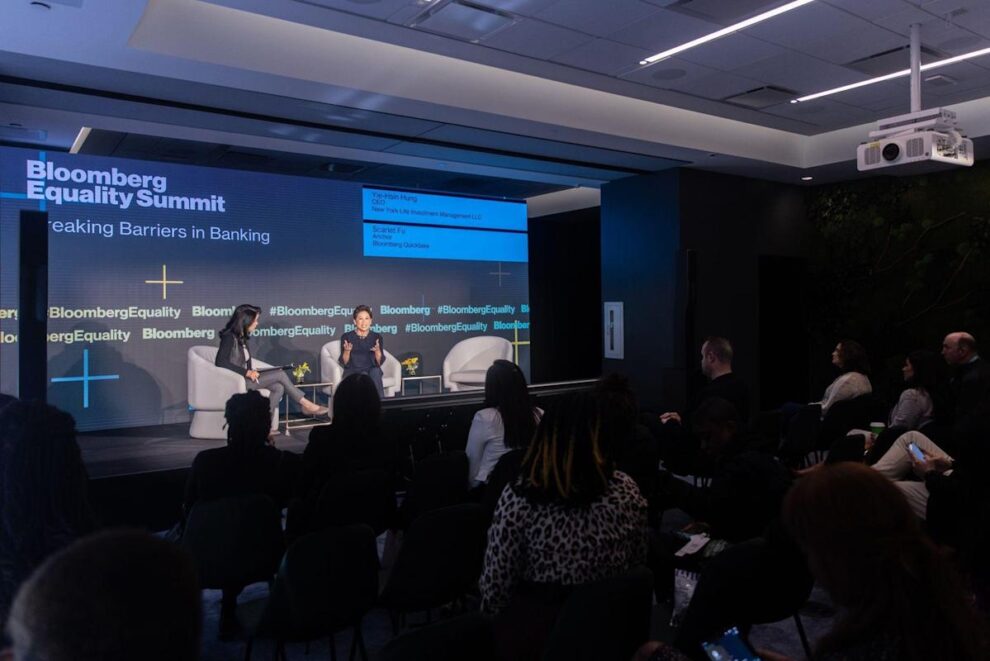
(Bloomberg) — Two years after the dual shocks of the Covid-19 pandemic and global Black Lives Matter protests led to greater calls for economic and racial equality, leaders across business and government are convening at Bloomberg’s Equality Summit to take stock of what’s changed and how to measure progress.
Most Read from Bloomberg
Economist Darrick Hamilton touted his “baby bonds” idea as a way for people to engage with markets. Meta’s VP of civil rights opened up about his role as an internal watchdog. Anne Clarke Wolff, the founder of Independence Point Advisors, called on Wall Street to create inclusive policies beyond paternity leave.
* See a full lineup here. Click here to read daily coverage from Bloomberg Equality.
Former Atlanta Mayor Says She’s Still Figuring Out Next Political Move (3:20 p.m.)
Democrats’ success during the midterm elections will hinge on convincing people they’re better off since President Joe Biden took office, former Atlanta Mayor Keisha Lance Bottoms said.
Alternative messaging from the Republican party has been geared toward making people unhappy and less inclined to vote, Bottoms said. Messaging will be a key part of campaign strategies, she said, adding that Democrats need to keep reminding people that elections matter.
“There are things being done that are making people’s lives better,” Bottoms said. “We have to speak about what’s happening that’s benefiting our community.”
When asked about her political aspirations beyond being mayor, Bottoms said she is “figuring it out.”
Asked if the White House was a goal, she responded: “Never say never.”
Visa CEO Says Company Is Helping Employees From War-Torn Ukraine (3:00 p.m. NY)
Visa Inc. Chief Executive Officer Al Kelly, who’s been helping employees and their families who have fled the war in Ukraine, said he expects a “prolonged battle” because Russian President Vladimir Putin has underestimated the strength of the resistance.
“We’re going to be there for our employees,” Kelly said. “This isn’t something we’re into for two or three weeks. We’re into it for the long term and whatever it takes to make sure they and their families are taken care of.”
Earlier this month, Kelly visited Dubai, which has become a landing spot for Visa employees fleeing Ukraine and Russia. There, he handed out clothing and toys to families affected by the war and spoke with teams assigned to relocate displaced workers.
It’s ‘Frustrating’ That ESG All Get Lumped Together, NYSE Chair Says (2:46 p.m. NY)
The term ESG is often lumped together even though environmental, social and governance issues for investors are all distinct issues, according to Sharon Bowen, chair of the New York Stock Exchange. “I get frustrated that they are linked together because they are very different things,” she said.
Some companies will focus on one aspect of ESG or another, she said.
“For them, it’s deciding on what’s really important to their investor, what’s important to the employees,” which is constantly evolving, Bowen added. “I don’t view these on political terms. It’s more what’s best for communities, what’s best for employees and how do we retain talent.”
‘A Sea of White:’ Latino Executives Remain Severely Underrepresented on Boards (2:15 p.m. NY)
Corporate boardrooms remain a “sea of White” and Latino executives are falling behind at every level of corporate America, said Esther Aguilera, CEO of the Latino Corporate Directors Association.
“We are far behind and the numbers are dismal,” she said.
Among Russell 3000 boards, only 2.3% of the seats are held by Latino executives and 85% are still held by White people, she said.Latino CEOs lead only 20 Fortune 500 companies and hold only about 4% of board seats, according to LCDA, even as the Latino population in the U.S. approaches 20% and is projected to eventually reach parity with the White population.
The percentage of new Black directors in the Fortune 500 almost tripled to about 28% in 2020, as the share for Latino directors slipped, according to a report by executive recruiter Heidrick & Struggles.
“Many corporate boardrooms don’t realize the profound failure,” said Luis Ubiñas, former president of the Ford Foundation and a director at AT&T Inc. Ubiñas said part of the problem is that the search firms “operate almost exclusively within the ecosystem that they know. Because they are Latino free zones, they don’t know any Latinos or Latinas to recommend.” Baby Bonds Give Everyone the Opportunity to Engage With the Market (12:45 p.m. NY)
Darrick Hamilton, a leading proponent of so-called baby bonds — a trust fund the government sets up at birth that pays out when they reach adulthood — says they’re an “automatic stabilizer” for poor kids. ”Whether you are born into a rich family or a poor family, you have a stake in this country,” he said.
The idea has gained more support after the murder of George Floyd as a way to address the racial wealth gap in the U.S. Connecticut and the District of Columbia recently established programs that will set aside money for thousands of babies. Washington state is taking steps toward a similar program that could launch in 2024. New Jersey’s governor has also pushed a plan to issue them. And Massachusetts’ treasurer is launching a “baby bonds task force” this spring.
Read more: A once radical idea to close the wealth gap is actually happening
“For markets to work, people need some power to engage in them,” Hamilton said. “If you enter a market with nothing, you have nothing to bargain with.”A PSA for “Smart Leaders”: Go to HBCUs to Hire (12:35 p.m. NY)
Smart leaders should look for talent at HBCUs, where networks and talent are strong, said Marcus Shaw, CEO of ALT Finance Corporation. And to rectify historical inequities, leaders must be intentional, since the barriers to diversity in the workplace were not put there by accident, he added.
Profitable companies in a range of industries all now prioritize diversity and inclusion, John Hope Bryant, founder and CEO of Operation HOPE, said. Still, the U.S. economy misses out of billions or more by failing to adequately bring Black workers and others into the workforce, he added.
Meta’s VP of Civil Rights Says He’s Already Proving His Value (11:55 a.m. NY)
In the first year since Roy L. Austin, Jr., the vice president of civil rights and deputy general counsel at Meta, has been in his job — which was created after a racial audit — he has built a team of 11 that covers voting, civic engagement, artificial intelligence and more.
“It was important to create that foundation,” Austin said. “It was important to know what Facebook, now Meta, could improve upon.” Out of the audit’s 117 recommendations, Meta has completed 55% of them, he said. He also wants to set up a “race measurement tool.”
Austin said he doesn’t think Meta needs another audit, but that having an “independent” team like his is more effective. Part of why Austin, who previously worked as a prosecutor, took the job was he thought he could have a big impact among the billions of people that use Facebook and Meta’s other platforms.
“Having someone who understands civil rights law… Having someone who every day is waking up thinking about those risks is crucial,” he said. A Bet on Non-Traditional Founders Is Paying Off for VC Firm Ulu Ventures (10:39 a.m. NY)
Venture capital’s focus on replicating success has kept funds from investing in diverse founders, said the CEO and co-founder of Ulu Ventures.
The “mythology”’ in venture capital circles that there’s no pipeline of companies founded by women and minorities to invest in “continues to make people avoid investments that could be very profitable,” said Miriam Rivera. Last year, female founders raised just 2% of all venture dollars.
KJ Sidberry, a principal at Forerunner Ventures agreed, saying “VC historically is an ecosystem where pattern recognition is something celebrated.”
Betting on non-traditional founders, however, has paid off for Ulu Ventures, where women-led companies are outperforming male-owned ones in its portfolio, said Rivera.
Clients and Companies Together Can Drive Diversity on Wall Street (10:09 a.m. NY)
The increased strength of shareholder activism and stakeholder interest in companies will drive Wall Street to increase its diversity, according to the founder of woman-led financial firm Independence Point Advisors.
“It’s not happening within the organizations, so where it will happen — the power is with the clients,” said Anne Clarke Wolff. “Clients drive the change, and Wall Street always responds to the client demand.”
Wall Street, however, can create more inclusive policies — and not just paternity leave. “Where you really need the balance is across the 21-plus years of child rearing,” she said, including flexible work schedules and allowing people to work outside of Midtown Manhattan.
David Rubenstein, co-founder and co-chairman of Carlyle Group, said his firm “takes pride” in the share of women among its ranks compared to other private equity firms but noted that change on Wall Street will still progress gradually.
“It’s not going to happen over night, in my view,” Rubenstein said.
Broadway Grapples With Inclusion After BLM Push to Make ‘Black Shows’ (9:35 a.m. NY)
After the murder of George Floyd in 2020 and the subsequent Black Lives Matter movement, Broadway, in the midst of Covid-related shutdowns, was quick to address issues of representation, but is still lagging in other ways. “On Broadway we’ve done a good job at representation,” says Bryan Terrell Clark, an actor who starred in the show “Thoughts of a Colored Man,” which ended its run in December. “Inclusion is a different thing.”
It’s not enough to simply be on stage, explains Krystal Joy Brown, who starred as Diana Ross in “Motown: The Musical” and as Eliza Schuyler in “Hamilton.”
“We have to be the owners, the creators, producers, and we have to have more at stake than just be a body people can see and say ‘oh great,’” she said. “Invite us in, it’s just not going to be us kicking the door down.”
Inclusion, Clark continues, isn’t simply a moral issue: it’s a business strategy. “What’s interesting is that I don’t think people really understand, is a diversity and inclusion strategy is not a moral thing to do, it’s a growth strategy,” he says. “As a business it’s important to understand that.”‘Nowhere to Hide:’ Companies Are Under Pressure to Close Pay Gaps (8:20 a.m. NY)
Companies are under more pressure to close the gender pay gap as investors, younger workers and new state and city laws increase pressure to disclose disparities, said Maria Colacurcio, the chief executive officer at Syndio, which provides software for companies to measure their pay gaps.
“A company doesn’t want to be exposed for having a really big pay gap,” said C. Nicole Mason, President & CEO, Institute for Women’s Policy Research. In 2020, women earned around 83 cents for every dollar a man made, according to the U.S. Census Bureau. That gap widens for Black, Hispanic and Native women. “Since 1972 the pay gap has only closed about 20 cents, it’s super glacial,” Mason added. According to the Census Bureau, in 1973 full-time working women earned, on average, 56.6 cents for every dollar their male peers made.
At least 7 U.S. states will be required to post salary information with job postings, or upon the request of job seekers. Colorado, Nevada, Connecticut, California, Washington, and Maryland have laws with some form of salary-range disclosure required; Rhode Island will join them in January 2023. Similar laws are under consideration in Massachusetts and South Carolina. New York is the first major metropolitan city in the U.S. to enact such legislation.
“Corporations are lagging, not leading in this space,” said Marisa Sternstein, associate general counsel, Dentsu International, who is an advisor on pay gap issues.
Colacurcio also touted a proposed law in California that would require employers to disclose how much they pay all their workers by gender, race and ethnicity. “You cannot hide from this,” she said.
Starting on May 15, New York City will require all job postings to list the minimum and maximum salary for each position. The rule applies to jobs that are remote or in-person, salaried or hourly, that will be performed in the city by an employee working for a company with four or more employees.
(Updates with new panel information.)
Most Read from Bloomberg Businessweek
©2022 Bloomberg L.P.









